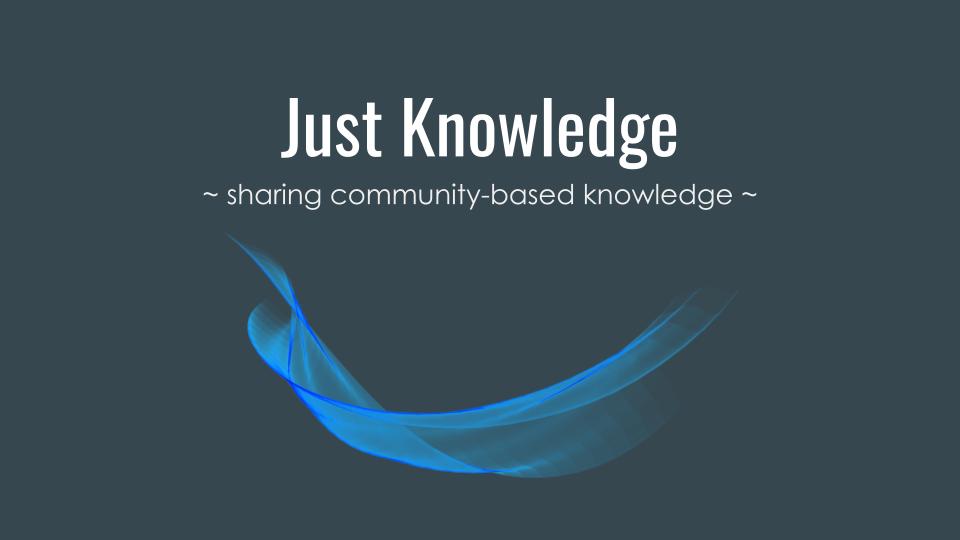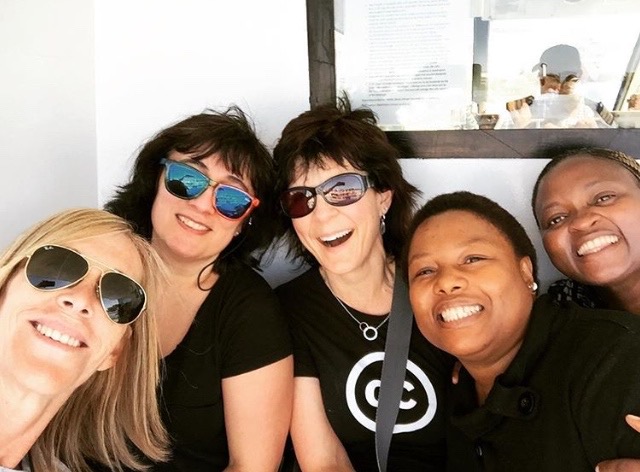
This is the first blog post for ‘Just Knowledge’, my GO-GN Fellowship 2022 research project. This post was published today on the GO-GN website at https://go-gn.net/research/just-knowledge-go-gn. I am re-publishing it here to have a record on my website.
Just Knowledge is a community-focused, open knowledge research project guided by three core ideals: justice, equity and openness. The aim of the project is to work with community-based knowledge initiatives to: (i) understand their current aims and challenges, (ii) study their use of digital and open approaches to accomplish those aims, and (iii) explore ideas together for context-appropriate, equity-focused, open approaches to knowledge sharing.
Project rationale
Although I have worked as an open educator within the higher education sector for many years, this GO-GN Fellowship is a departure from that standpoint. Now working independently, outside a higher education institution/organisation for the first time in many years, I have shifted my focus for this fellowship to the needs of communities beyond higher education, reflecting on broader values of open knowledge and epistemic justice.
Community-focused initiatives, located within HEIs or not, may lack adequate support for developing and using open educational practices, and thus in making the most of sharing open knowledge with their associated communities. Conversely, resources may be shared openly without a full understanding of copyright, consent, and other critical considerations regarding openness.
Project description
Just Knowledge will engage with four different community-focused organisations/initiatives – members of each will be considered research partners. The project has three research aims. The first is to understand each initiative’s aims and current challenges in relation to knowledge sharing. The second aim is to work with community partners in each initiative to review their use of digital and open approaches to accomplish their aims. The third aim is to work together with community partners in each initiative to explore context-appropriate, equity-focused, open approaches to knowledge sharing. Findings for each initiative, as well as analysis across all four initiatives, will be documented in a final GO-GN Fellowship report.
By design, the Just Knowledge project is guided by three core ideals: justice, equity and openness. To ensure this, the underlying principles of the project are drawn from Data Feminism, an approach to data ethics informed by intersectional feminism (D’Ignazio & Klein, 2020). These seven principles are: Examine power; Challenge power; Elevate emotion and embodiment; Rethink binaries and hierarchies; Embrace pluralism; Consider context; and Make labour visible. As D’Ignazio and Klein note:
Data feminism can help to remind us that before there are data, there are people––people who offer up their experiences to be counted and analysed… There are also, always, people who go uncounted––for better or worse. And there are problems that cannot be represented––or addressed––by data alone. And so data feminism, like justice, must remain both a goal and a process, one that guides our thoughts and actions as we move toward our goal of remaking the world. (p. 10)
Community partners
Following is a description of each of the four organisations/initiatives participating in the Just Knowledge project: two are independent of higher education; two are embedded within higher education institutions. The Just Knowledge project will engage with each organisation/initiative in relation to one specific aspect of their work, as identified in the course of discussions with the partners. At this early stage, the specific focus area has been agreed for two of the four projects, as noted below.
i) GALWAY TRAVELLER MOVEMENT (GTM)
GTM’s work is rooted in an understanding of and respect for the distinct culture and ethnic identity of the Traveller community. GTM’s vision is “full equality, social justice and human rights for members of the Traveller community, and meaningful participation of Travellers in social, economic, political and cultural life”. The overall mission of GTM is “to challenge discrimination and racism experienced by the Traveller community in Galway city and county; to challenge the status quo and to empower members of the Traveller community to take action to realise Traveller rights”.
The specific focus for Just Knowledge is a new project to create a digital/open map showing traditional Traveller encampments in Galway city and county, together with historical details. The digital/open map will be based on a recently created physical map and associated metadata.
ii) GREEN SOD IRELAND
Green Sod Ireland’s aim is to protect and conserve Irish land in perpetuity, for present and future generations: “In holding land in trust, we acknowledge and respect it for its own sake, thus protecting its indigenous life from destruction. Green Sod Ireland works with local communities, raising awareness of the health, educational, social, economic and environmental benefits of caring for the land and its biodiversity.” Green Sod Ireland develops and deliversprimary, secondary and adult education programmes and resources – all relating to ecological education.
The specific focus for Just Knowledge is to explore how best to share openly-licensed versions of existing community education programmes so as to reach wider communities and further the overall mission of Green Sod Ireland, i.e. to protect land for its own sake and for the sake of the species that live on it.
iii) SUSTAINABILITY IN THE COMMUNITY NETWORK, AT ATLANTIC TECHNOLOGICAL UNIVERSITY (ATU)
ATU’s Centre for Sustainability aims to “embed sustainability and the Sustainable Development Goals (SDGs) as core guiding principles across all activities” in ATU with a particular focus on curriculum, campus management and operations, community engagement, collaborative research and culture.
The specific focus for Just Knowledge is a newly created ‘Sustainability in the Community’ network which aims to support and promote biodiversity conservation in teaching and learning on all ATU campuses and through community and knowledge sharing activities across the region.
iv) UNIVERSITY OF SANCTUARY, AT TECHNOLOGICAL UNIVERSITY OF THE SHANNON (TUS), MIDLANDS MIDWEST
The aim of TUS’s University of Sanctuary programme is to create a culture of welcome and inclusion for asylum seekers, refugees and migrants at the institution. This includes a Sanctuary Scholarship Programme that offers places for students on the institution’s access and undergraduate programmes.
The specific focus for Just Knowledge is under discussion.
Just Knowledge project and the GO-GN network
Undertaking this research project in the context of the GO-GN Fellowship provides multiple benefits for the community partners, as well as for me as the principal researcher. Project updates (as agreed by community partners) will be shared openly via GO-GN blog posts and webinars. GO-GN members and others are invited to contribute relevant ideas, resources, contacts, and suggestions.
In addition, each of the initiatives may have specific requests for information and/or resources. For example, at present, the Galway Traveller Movement is interested in exploring/sharing ideas with mapping projects in other Indigenous communities, e.g. in North America and Australia.
Sincere thanks, once again, to GO-GN for providing the opportunity to further this research. The organisers and members of the broad GO-GN network have been a source of inspiration and encouragement for many years, beginning during my time as a PhD researcher in open education. I am very grateful for the support. I will continue to share project updates here in the GO-GN blog, here in my own blog, and on Twitter at @catherinecronin.
References:
D’Ignazio, C., & Klein, L. F. (2020). Data Feminism. Cambridge, MA: MIT Press. https://data-feminism.mitpress.mit.edu/
